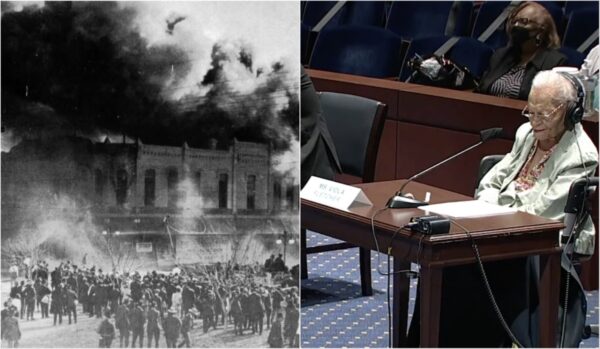The road to justice for the victims of the Tulsa Race Massacre has taken a significant step backward, as an Oklahoma county judge has dismissed their lawsuit seeking compensation.
The lawsuit, filed in February 2021, targeted the Board of County Commissioners, Tulsa Metropolitan Area Planning Commission, and Tulsa County Sheriff, along with the Oklahoma Military Department, Tulsa Chamber, and the Tulsa Development Authority.

Tulsa County District Court Judge Caroline Wall agreed with defendants in the case who argued on various grounds that the lawsuit should dismissed, writing in her July 7 ruling that their motions “should and shall be granted upon the grounds set forth in the defendants’ briefs.”
Viola Fletcher, Lessie Bennifield Randle and Hughes Van Ellis are the last living survivors. They were children when the massacre occurred and are all over 100 years old.
“We just heard people running and screaming and could smell smoke, seeing houses burning and people getting shot, falling dead,” Fletcher, now 109, told CNN. “In every direction you look, really, there was something going on and we always wondered why, but nobody had time to tell.”
The legal action sought the establishment of a dedicated fund for the victims and their descendants, seeking redress for the racial riots that ravaged the Greenwood District in 1921, resulting in the reported death of 300 people and the destruction of a thriving Black community.
The aftermath of this tragedy left damages amounting to tens of millions in today’s currency, eradicating generational wealth within the once affluent neighborhood, according to reports.
The victims also demanded an official acknowledgment from the defendants that the massacre constituted a “public nuisance” under Oklahoma law, affecting the former Black residents of the Greenwood District and their offspring. They claim the city and insurance companies failed to compensate them for their losses, and city officials actively hindered efforts to rebuild the community, and as a result, the riot destroyed their economic standing.
The defendants argued that some plaintiffs had not directly proved they suffered because of the massacre and that the court could not provide redress for the alleged damages.
Notably, U.S. District Court Judge James O. Ellison had previously ruled in 2004 that the victims were ineligible for reparations due to the considerable time that had elapsed since the massacre occurred.
According to a 2001 report by a state-sponsored commission, the riots erupted on May 31, 1921, after a white mob attempted to lynch a 19-year-old Black shoe shiner named Dick Rowland.
Rowland had been riding in an elevator with a white teenager named Sarah Page, who reportedly screamed, resulting in a white mob falsely accusing Rowland of sexual assault. As tensions escalated, Black residents Greenwood residents went to the courthouse to defend the shoe shine, but they were outnumbered by their white counterparts.
The next day, June 1, 1921, the Black neighborhood endured 24 hours of looting and arson at the hands of white rioters.
Fletcher said her family fled with “what we had on our backs.”
“Someone ran through the neighborhoods and said for all the Black people to get out of town before we were killed, the white people was killing all of the Black people. So my family gathered us up,” she said.
Reports indicate that over 1,250 homes and two hospitals were destroyed, leaving a scorched path of racial violence encompassing 35 blocks. The estimated total cost of the damages, adjusted for today’s value, is $27 million, as determined by the commission’s findings.
Judge Wall dismissed the claims with prejudice, meaning they cannot be filed again, although the plaintiffs may appeal Friday’s ruling.


